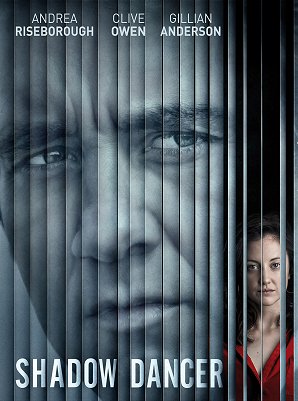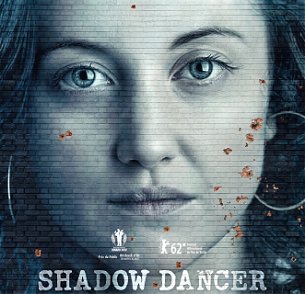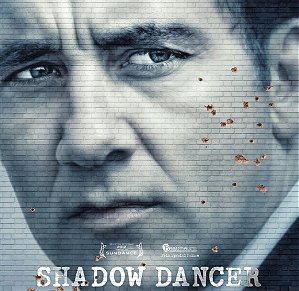Deception and Betrayal:
Shadow Dancer
(2012)

In the brief prologue to James Marsh’s film Shadow Dancer we are in Belfast, 1973, at the height of the Troubles. When young Collette McVeigh (Andrea Riseborough) is asked by her father to run out to the shop for some cigarettes she instead bribes her little brother to go for her whilst she finishes making a necklace. Outside her window the audience sees signs of panic although she remains oblivious, caught up in her hobby. Horrifyingly, but off screen, he is shot and killed. It is a harrowing moment when the boy is brought back into the house and the distraught parents and neighbours gather around, trying to will him back to life.
The father stares at the distraught little girl before closing the door firmly on her; and in effect on the life she might have led.
We move to 1993 London and the adult Collette is boarding a train in the Underground. From the attention that is paid to her bag it is pretty obvious that she is about to plant a bomb. She stares at her various fellow passengers with a complete lack of emotion that tells us sharply that the trauma of twenty years ago is still very much with her. In fact she has become an IRA activist. However, the bomb plot is aborted and Collette finds herself being coerced by Mac (Clive Owen) into becoming an informer for MI5; it’s either that or decades in an English prison and her son in Belfast taken from her.
I can only recommend this film to you if you approach it on its own terms: do not expect flashy action scenes; there aren’t any. It is low key and grim from start to finish, with director Marsh letting the scenes play out just as much as he feels they need to. The dialogue is sparse and brittle, giving you just as much as screenwriter Tom Bradby thinks that you need to know and since it is based on his own novel we’re going to have to accept that.
For all that it is a pretty shitty job that Mac has, Owen plays him as an essentially decent man. He is obviously doing this for his country but he feels a profound protectiveness towards-–and is possibly attracted to—the girl that he has essentially blackmailed into working for him. Brid Brennan is wonderful as the perpetually worried mother of Collette and as for her Republican brothers, well, they’re doing their job too, aren’t they?
Ultimately much of the film rests on the face and expressions of Andrea Riseborough; and she does a marvellous job of showing a woman who is torn between what she is forced to do and protecting what she has left in her life. Yet for all the sympathy that I felt towards her I found it impossible to forget that cold look that she carried along with the Underground bomb. Perhaps that is the point. In fact, bizarrely, I found that her opposite number in the film was probably Mac’s boss Kate Fletcher, played with an icy control by Gillian Anderson. In fact there is a nice and understated scene where we see Kate’s airy, comfortable home compared to the rather gray working-class environment that Collette moves in. Yet the two struck me as not so far apart as you might think.
In many ways I was reminded of last year’s Tinker, Tailor, Soldier, Spy and yet I responded much more to that equally downbeat exercise. That’s something that bothers me a little. After all, what would I know of how the Cold War was playing out in the early seventies? Obviously for those directly involved in the Troubles it will never be completely over for them. Yet for people like me in the South of Ireland it is a period that is already beginning to seem remote. Yes, that bothers me quite a bit.
Since this takes place in a Northern Ireland on the very brink of peace I would like to have had the different feelings towards that explored a bit more. Gerry (Aiden Gillan), the older brother is vocally against it, seeing it as a compete surrender; but that seems so to be as far as it goes.
There are also small annoyances such as a supposed professional like Mac giving his real name far too readily. As for the stretch of coastline where Mac has the two secretly meet, that just struck me as unlikely in the extreme. After all, this is a woman who is seriously under suspicion and yet there she is in the wide open spaces and wearing a bright red coat into the bargain!
I’m quibbling, though. There is a lot to take out of this film, but I have a feeling that the main audience that it will find is an art house one. There’s nothing wrong with that, of course, except that I have the impression that perhaps it was reaching for something more.



Recent Comments